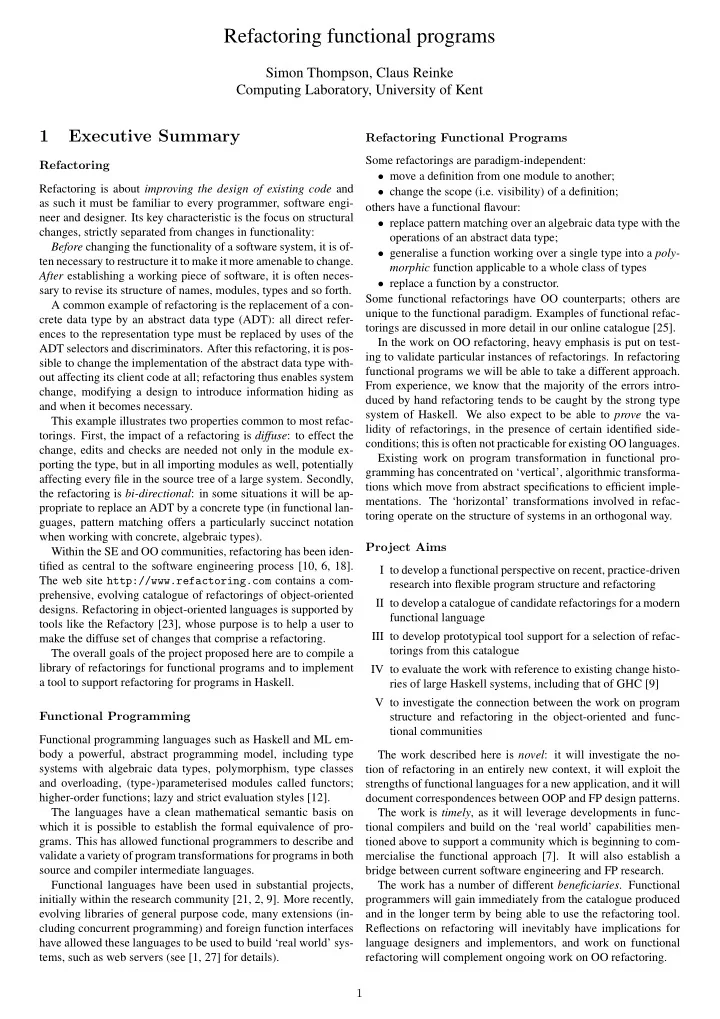

Refactoring functional programs Simon Thompson, Claus Reinke Computing Laboratory, University of Kent 1 Executive Summary Refactoring Functional Programs Some refactorings are paradigm-independent: Refactoring • move a definition from one module to another; Refactoring is about improving the design of existing code and • change the scope (i.e. visibility) of a definition; as such it must be familiar to every programmer, software engi- others have a functional flavour: neer and designer. Its key characteristic is the focus on structural • replace pattern matching over an algebraic data type with the changes, strictly separated from changes in functionality: operations of an abstract data type; Before changing the functionality of a software system, it is of- • generalise a function working over a single type into a poly- ten necessary to restructure it to make it more amenable to change. morphic function applicable to a whole class of types After establishing a working piece of software, it is often neces- • replace a function by a constructor. sary to revise its structure of names, modules, types and so forth. Some functional refactorings have OO counterparts; others are A common example of refactoring is the replacement of a con- unique to the functional paradigm. Examples of functional refac- crete data type by an abstract data type (ADT): all direct refer- torings are discussed in more detail in our online catalogue [25]. ences to the representation type must be replaced by uses of the In the work on OO refactoring, heavy emphasis is put on test- ADT selectors and discriminators. After this refactoring, it is pos- ing to validate particular instances of refactorings. In refactoring sible to change the implementation of the abstract data type with- functional programs we will be able to take a different approach. out affecting its client code at all; refactoring thus enables system From experience, we know that the majority of the errors intro- change, modifying a design to introduce information hiding as duced by hand refactoring tends to be caught by the strong type and when it becomes necessary. system of Haskell. We also expect to be able to prove the va- This example illustrates two properties common to most refac- lidity of refactorings, in the presence of certain identified side- torings. First, the impact of a refactoring is diffuse : to effect the conditions; this is often not practicable for existing OO languages. change, edits and checks are needed not only in the module ex- Existing work on program transformation in functional pro- porting the type, but in all importing modules as well, potentially gramming has concentrated on ‘vertical’, algorithmic transforma- affecting every file in the source tree of a large system. Secondly, tions which move from abstract specifications to efficient imple- the refactoring is bi-directional : in some situations it will be ap- mentations. The ‘horizontal’ transformations involved in refac- propriate to replace an ADT by a concrete type (in functional lan- toring operate on the structure of systems in an orthogonal way. guages, pattern matching offers a particularly succinct notation when working with concrete, algebraic types). Project Aims Within the SE and OO communities, refactoring has been iden- tified as central to the software engineering process [10, 6, 18]. I to develop a functional perspective on recent, practice-driven The web site http://www.refactoring.com contains a com- research into flexible program structure and refactoring prehensive, evolving catalogue of refactorings of object-oriented II to develop a catalogue of candidate refactorings for a modern designs. Refactoring in object-oriented languages is supported by functional language tools like the Refactory [23], whose purpose is to help a user to III to develop prototypical tool support for a selection of refac- make the diffuse set of changes that comprise a refactoring. torings from this catalogue The overall goals of the project proposed here are to compile a library of refactorings for functional programs and to implement IV to evaluate the work with reference to existing change histo- a tool to support refactoring for programs in Haskell. ries of large Haskell systems, including that of GHC [9] V to investigate the connection between the work on program Functional Programming structure and refactoring in the object-oriented and func- tional communities Functional programming languages such as Haskell and ML em- body a powerful, abstract programming model, including type The work described here is novel : it will investigate the no- systems with algebraic data types, polymorphism, type classes tion of refactoring in an entirely new context, it will exploit the and overloading, (type-)parameterised modules called functors; strengths of functional languages for a new application, and it will higher-order functions; lazy and strict evaluation styles [12]. document correspondences between OOP and FP design patterns. The languages have a clean mathematical semantic basis on The work is timely , as it will leverage developments in func- which it is possible to establish the formal equivalence of pro- tional compilers and build on the ‘real world’ capabilities men- grams. This has allowed functional programmers to describe and tioned above to support a community which is beginning to com- validate a variety of program transformations for programs in both mercialise the functional approach [7]. It will also establish a source and compiler intermediate languages. bridge between current software engineering and FP research. Functional languages have been used in substantial projects, The work has a number of different beneficiaries . Functional initially within the research community [21, 2, 9]. More recently, programmers will gain immediately from the catalogue produced evolving libraries of general purpose code, many extensions (in- and in the longer term by being able to use the refactoring tool. cluding concurrent programming) and foreign function interfaces Reflections on refactoring will inevitably have implications for have allowed these languages to be used to build ‘real world’ sys- language designers and implementors, and work on functional tems, such as web servers (see [1, 27] for details). refactoring will complement ongoing work on OO refactoring. 1
Recommend
More recommend